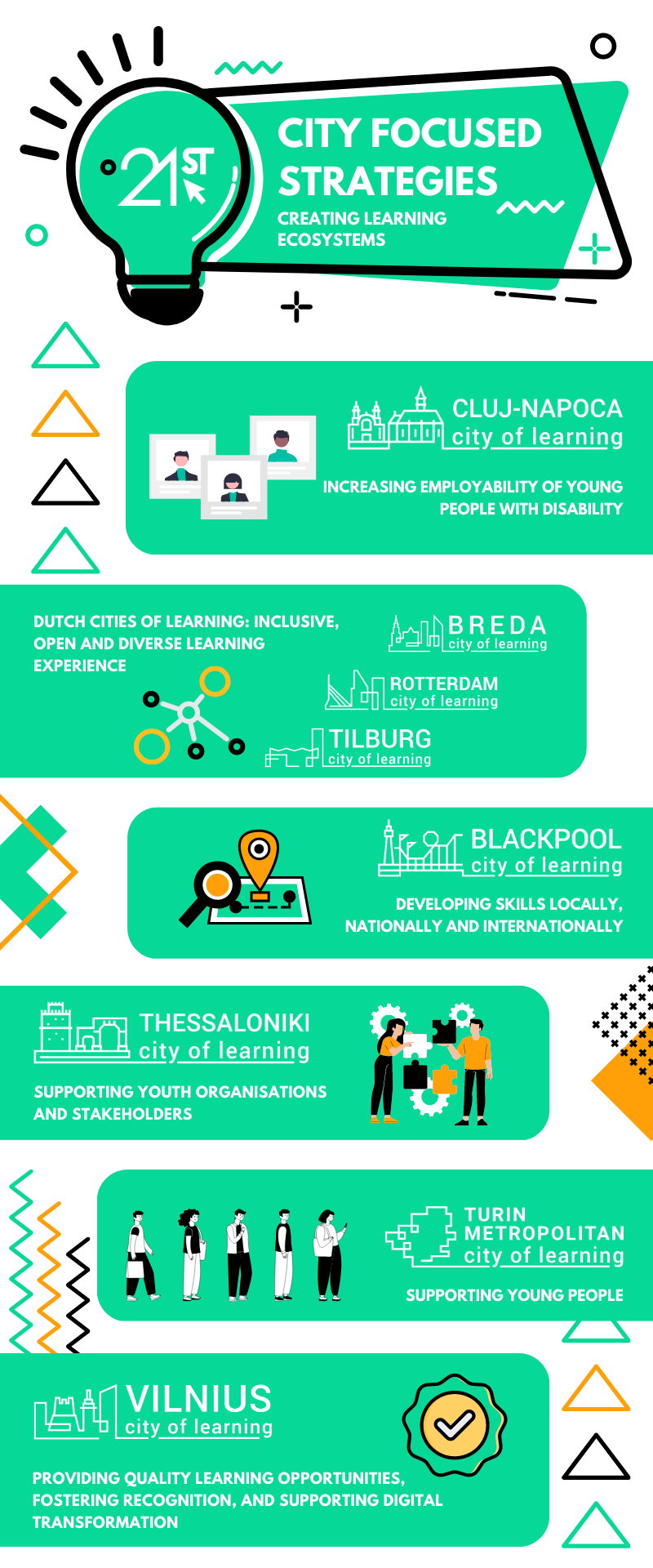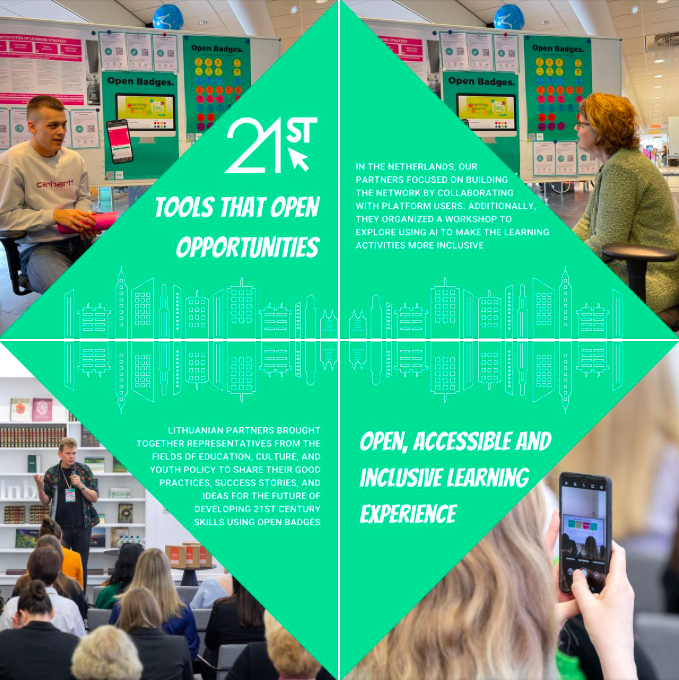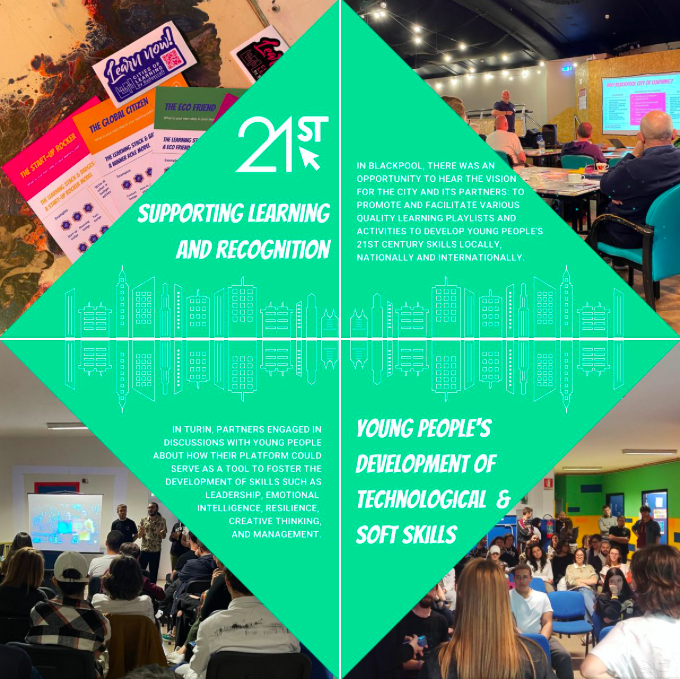Online 21st century skills education

The implementation of the project “Online 21st century skills education” aims to address the need for digitalization in societies, particularly in the context of the ongoing pandemic crisis. With a focus on strategic partnerships for youth, this project seeks to provide young people with continuous access to learning opportunities while adapting to the online environment. By leveraging the Cities of Learning framework and developing a mobile app, this initiative aims to promote 21st century skills development, enhance digital learning experiences, and empower young individuals to become architects of their own lives.
Why transnational?
Such developments are too expensive for a single municipality or organisation to finance. Therefore European strategic partnership will enable all partners and youth work field benefit from shared practices and joint effort to develop innovative solutions for digital youth work in Europe.
Partners: Skills Connect (leading partner, NL), Nectarus (LT), Badgecraft Ireland, Think Forward C.I.C (UK), Madiba (IT), Kids in Action (GR), Babilon Travel (RO) and Creativitas (LT)
![]()
![]()
![]()
![]()
![]()
![]()
Disclaimer: The European Commission’s support for the production of materials below does not constitute an endorsement of the contents, which reflect the views only of the authors, and the Commission cannot be held responsible for any use which may be made of the information contained therein.
![]()
This project idea takes place in the digitalisation of societies, which is now additionally accelerated by the lockdowns due to the pandemic crisis. Youth work is actively searching for ways to organise youth work online without stopping their services to young people.
All partners had the initial needs analysis in their organisations and their municipalities to identify the most recent challenges and gaps in youth work provisions. Needs analysis included mainly interviews and document analysis.
Partners identified that young people spend more leisure time by using digital tools and the internet. It requires youth workers to be where young people are. Youth work organisations are looking for ways to combine residential, in-person activities with online solutions.
At the same time, most of our local partners – youth work organisations identify a lack of skills to implement digital youth work, to combine residential and online opportunities. In most cases, cities do not provide guidance and infrastructure to support organisations in organising youth work flexibly.
A common challenge is the lack of youth work programmes oriented towards competencies and skills needed for young people to thrive today and in the future. That’s where the 21st-century skills idea originates.
Objectives:
- Creating city-specific strategies to promote opportunities for young people to develop 21st century skills.
- Developing the capacity of partner organizations to utilize the Cities of Learning framework and recognize the 21st century skills of young people.
- Enhancing access to 21st century learning opportunities through the development of a mobile app for Cities of Learning.
- Promoting new opportunities for 21st century skills at the participating countries and European levels.
Targets:
- Young people, including those with disabilities and fewer opportunities.
- Youth workers.
- Managers of youth work organizations and youth projects.
- Local organizations providing 21st century skills development activities.
- Youth work stakeholders in the involved cities.
Vilnius, the vibrant capital of Lithuania, played host to international partners working on 21st-century skills education and recognition. To discover more about the transformative visit to Vilnius City of Learning and the inspiring initiatives in 21st-century skills education, EXPLORE the blog post and delve deeper into the rich experiences, insights, and shared stories from international partners. Get inspired by Vilnius’ innovative approach to youth work, co-creation, and inclusive learning. Learn from the best practices and reflect on how you can implement similar initiatives in your own community.
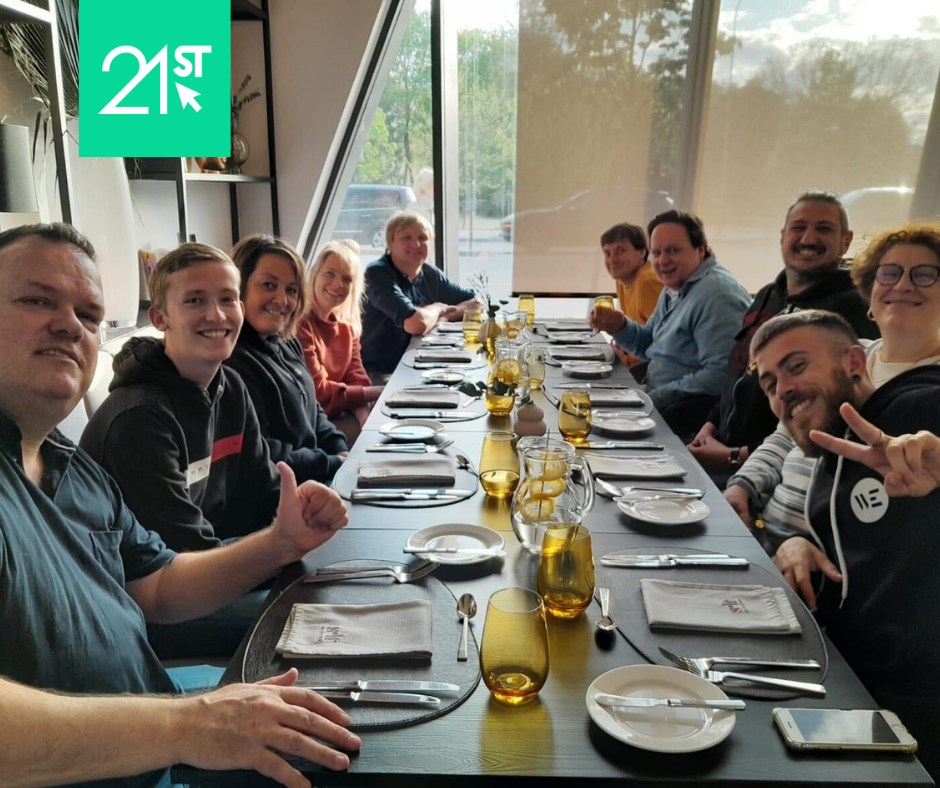
The partnership has successfully created city learning strategies that focus on developing crucial skills for young people. This output was a key step towards achieving the project’s objectives. Learn about the methodology used to create these effective strategies, which can be transferred to other cities or locations aspiring to establish their own City of Learning. While the content is tailored to specific contexts, it holds valuable insights that can be adapted and applied to similar locations within the same country. Unleash the potential of 21st century skills in your community by delving into the details and unlocking new possibilities. CLICK HERE to find out more about the methodology and process, or CLICK ON THE VISUAL to go deeper into the strategies.
By creating learning pathways directly led to the achievement of project objectives to develop the capacity of partner organizations to use Cities of Learning framework to create new digital learning opportunities and recognize 21st century skills of young people, and promote new opportunities of 21st century skills in participating countries and on the European level.
Here is a list of learning playlists featuring various activities and opportunities for skills development in different areas created by project’s partners:
- Mental health promotion in the youth field – Link – Skill Area: Resilience
- 21st century skills development during skating – Link – Skill Area: Resilience
- Getting to know Rotterdam – municipality – Link – Skill Area: Taking Responsibility
- Sustainable development goals – Link – Skill Area: Sustainable Development
- Ik ben Open volunteer work – Link – Skill Area: Social Media Skills
- Skills framework for young people who dropped out – Link – Skill Area: Dealing with Change and Adapt
- Sta Sterk in je werk from 14/3 – Link – Skill Area: Organize and Execute
- Welkom in Westland from 14/3 – Link – Skill Area: Dealing with Change and Adapt
- Op weg naar financiële zelfredzaamheid from 14/3 – Link – Skill Area: Analyze and Interpret
- Participatieverklaring from 14/3 – Link – Skill Area: Create and Learn
- Taal en KNM: Lesprogramma Z route – Link – Skill Area: Create and Learn
- Taal en KNM: Lesprogramma B1 route – Link – Skill Area: Create and Learn
- Taal en KNM: Welkomweken B1 route – Link – Skill Area: Create and Learn
- Taal en KNM: Welkomweken Z route – Link – Skill Area: Create and Learn
- Barista basis – Link – Skill Area: Critical Thinking and Promple Solving
- Digital skills – Link – Skill Area: Digital Skills
- Active Citizenship – Link Skill Area: Active Citizenship
- LifeComp – Link
- Crearsi l’opportunità – Link – Skill Area: Multiple Skills
- Keep Moving – Direzione Futuro – Link – Skill Area: Multiple Skills
- Digital future – Link
- RicicliAmo – Link
- DateDaFè – Link
- Learning the 21st Century Skills – Link – Skill Area: Various 21st Century Skills
- Buildingblocks for your SkillsPas – Link – Skill Area: Create and Learn
- StartPas “De brug naar werken en leren” – Link – Skill Area: Dealing with Change and Adapt
- EMVIMIL: The Practical Approach – Link
- Peer Educators Induction – Link – Skill Area: Taking Responsibility
- Gimme Five – Link – Skill Area: Multiple Skills
- Mereside Innit – Link – Skill Area: Literacy
- Our Friends Electric – Link – Skill Area: Multiple Skills
- Incluziune si Accesibilitate (Inclusion and Accessibility) – Link
- Growing in Insight-ability of mobility (GIM) – Link
- Ικανότητα Επίλυσης Προβλημάτων- Problem Solving Skills – Link – Skill Area: Self-Management, Problem Solving
- Iκανότητα εργασίας σε διαπολιτισμικά περιβάλλοντα- working in multicultural environments – Link – Skill Area: Team Work, Intercultural
- Self Confidence – Αυτοπεποίθηση – Link – Skill Area: Developing Self Confidence
- Environmental Literacy – Περιβαλλοντικός Γραμματισμός – Link – Skill Area: Environmental Literacy and Sustainability
- Learning to Learn – Link – Skill Area: Learning to Learn
- Time management skills – Link – Skill Area: Self-Management, Time Management
- Designing green growth learning aids for young persons with disabilities – Link
- Volunteering conference playlist – Link – Skill Area: People Management, Digital Skills
- Volunteering opportunities in a Youth centre – Link – Skill Area: Team Work, Creativity
- Basics of personal career management – Link – Skill Area: Self-Management
- From Creativity to Entrepreneurship – Link – Skill Area: Creativity, Entrepreneurship
- Leadership essentials – Link – Skill Area: Leadership Skills
- Spoekn and written English – Link – Skill Area: Public Speaking, Foreign Language Skills
- Management of job search process – Link – Skill Area: Planning and Self-Management
- Self-knowledge and personal image – Link – Skill Area: Self-Management
- Psychology of stress – Link – Skill Area: Stress Management
- Critical thinking (in English, for foreign students) – Link – Skill Area: Critical Thinking
- Time management – Link – Skill Area: Time Management
- Critical thinking (in Lithuanian) – Link – Skill Area: Critical Thinking
- Volunteering at MO museum in Vilnius – Link
- Training on how to use the Volunteering platform (as a version of Cities of Learning platform) – Link
- Learning to be a peer teacher in orphanages – Link – Skill Area: Volunteering, Teaching, Social Responsibility
- European Year of Skills – Link
- Teamwork for Diversity – Link
- Zilele Clujului: Aventuri senzoriale – Link
- Antreprenoriat pentru tinerii cu deficiențe de auz – Link
- Voluntariat pentru tinerii cu deficiențe de auz – Link
The City Badge Wallet App directly led to the achievement of project objectives to create better access to 21st century learning opportunities and promote new opportunities of 21st century skills in participating countries and on the European level.
As a result of this output, partners delivered a Mobile App for Cities of Learning, which was made available for both Android and iOS versions. Young people and learning providers played a direct role in user research and testing of this digital innovation. A promotional video and tutorials were created to guide young people and learning providers on how to use the Mobile App, thus promoting this innovative tool among the target audience in participating cities.
The Mobile App answers the following needs:
- one time download and login to the App make the experience of engaging with the activities and content straightforward and smooth;
- interactions between youth workers and young people are more organic and natural to the mobile user experiences of young people;
- all completed activities and earned badges are available to showcase on the go.
Functionalities of the App allow to:
- register / login and manage user account settings, including privacy policy and data protection;
- search the list of learning opportunities in a city and apply various filters to find something specific;
- navigate the map of a city to find learning opportunities based on location filters;
- view the content of activities and playlists and join them to participate and achieve the learning;
- use badges to upload evidence of skill, learning, experience or achievement;
- view and manage earned badges on personal portfolio;
- social learning interactions, e.g. messages or chat.
At the beginning, a brandbook and communication guidelines were developed to provide partners with visual materials and ensure consistent communication, establishing a distinct presence among other initiatives.
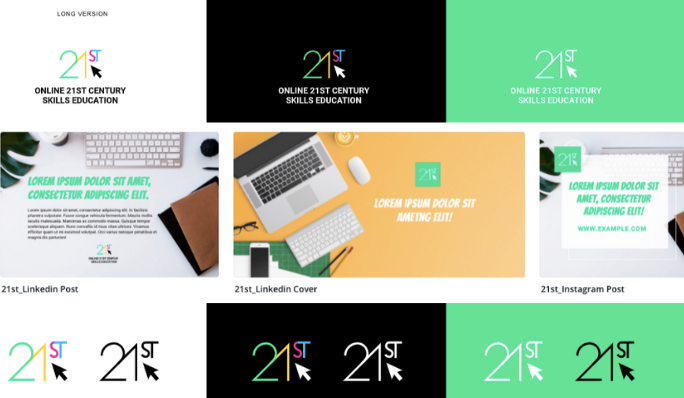
8 communication campaigns were implemented in total. 2 European campaings were led by the communication partner “Creativitas”. The first one was designed to contribute to the achievements of IO1, focused on raising awareness of 21st century skills and related topics.
The campaign content covered essential aspects, such as understanding what 21st century skills entail, exploring how youth workers and educators can acquire these skills, and highlighting effective strategies to support young people in their skill development journey. Through engaging and short 8 videos, we aimed to foster a deeper understanding and appreciation of these skills among our audience on Facebook, LinkedIn and Instagram.
The last European social media campaign was conducted at the end of the project and strategically designed to achieve two key goals: to highlight the Cities of Learning processes within the context of the European Year of Skills and to disseminate the project’s results to a wider audience.
The campaign ran for a duration of four weeks, from 1st to 26th May, ensuring a consistent and engaging presence throughout this period. To maintain active engagement, content was shared three times per week, providing regular updates and insights.
The campaign primarily utilized the Facebook and LinkedIn platforms, leveraging their broad reach and ability to target specific audience segments. The selected formats for content included still posts and animated visuals, captivating the attention of the audience and conveying information in an accessible manner.
To maximize the campaign’s impact, a paid media strategy was implemented, allowing for increased visibility and reach among the target audience. This approach ensured that the campaign reached a wider network of individuals interested in the European Year of Skills, 21st Century Skills, and Cities of Learning.
To enhance the campaign’s visibility and promote engagement, specific hashtags were utilized, including #EuropeanYearOfSkills, #21stCenturySkills, and #CitiesOfLearning. These hashtags were strategically chosen to align with relevant topics and facilitate the discovery of campaign content by individuals interested in these areas.
|
Other 6 campaigns were implemented by partners on the local levels. Moreover, partners also organised multiplier events in their cities to disseminate and celebrate the achievements of the project.
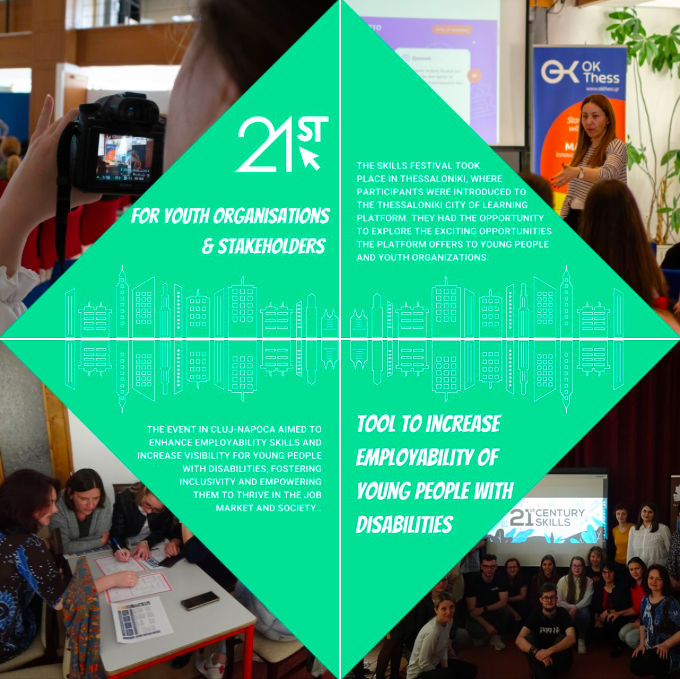
Through these communication efforts, over 195 000 individuals from the target groups were reached. The general public was also informed about the project and its accomplishments through the dissemination activities, including social media posts, events, and other promotional materials. By leveraging these communication and dissemination strategies, the project successfully engaged and involved a wide range of stakeholders while ensuring that the broader community was well-informed about the project’s goals and achievements
We would like to invite you to join our vibrant community and stay connected with us through multiple channels. By following us on Facebook and LinkedIn, you’ll gain access to our latest updates, valuable content, and engaging discussions. Additionally, we highly recommend subscribing to our newsletter, where you’ll receive regular updates delivered directly to your inbox. Our newsletter is a convenient way to stay informed about our projects, initiatives, events, and opportunities. Don’t miss out on the chance to be part of our community and stay up-to-date with the exciting things happening.
Impact:
- Strengthened strategic and targeted approach to youth work, focusing on 21st century skills in partner municipalities.
- Increased capacity of organizations to deliver digital youth work in the six participating municipalities.
- Enhanced 21st century skills among young people.
- Enhanced international cooperation among project partners and local collaboration among youth work organizations.
Longer-Term Benefits:
- Increased opportunities for young people in their cities to develop and receive recognition for 21st century skills.
- Establishment of local and international networks of learning providers promoting opportunities for 21st century skills development.
- Expanded reach and impact of Cities and Regions of Learning, transforming learning practices in the 21st century.
- Introduction of digital innovations, such as learning pathways on the Cities of Learning platform and a Mobile App tailored to the needs of young people and youth work practices.

